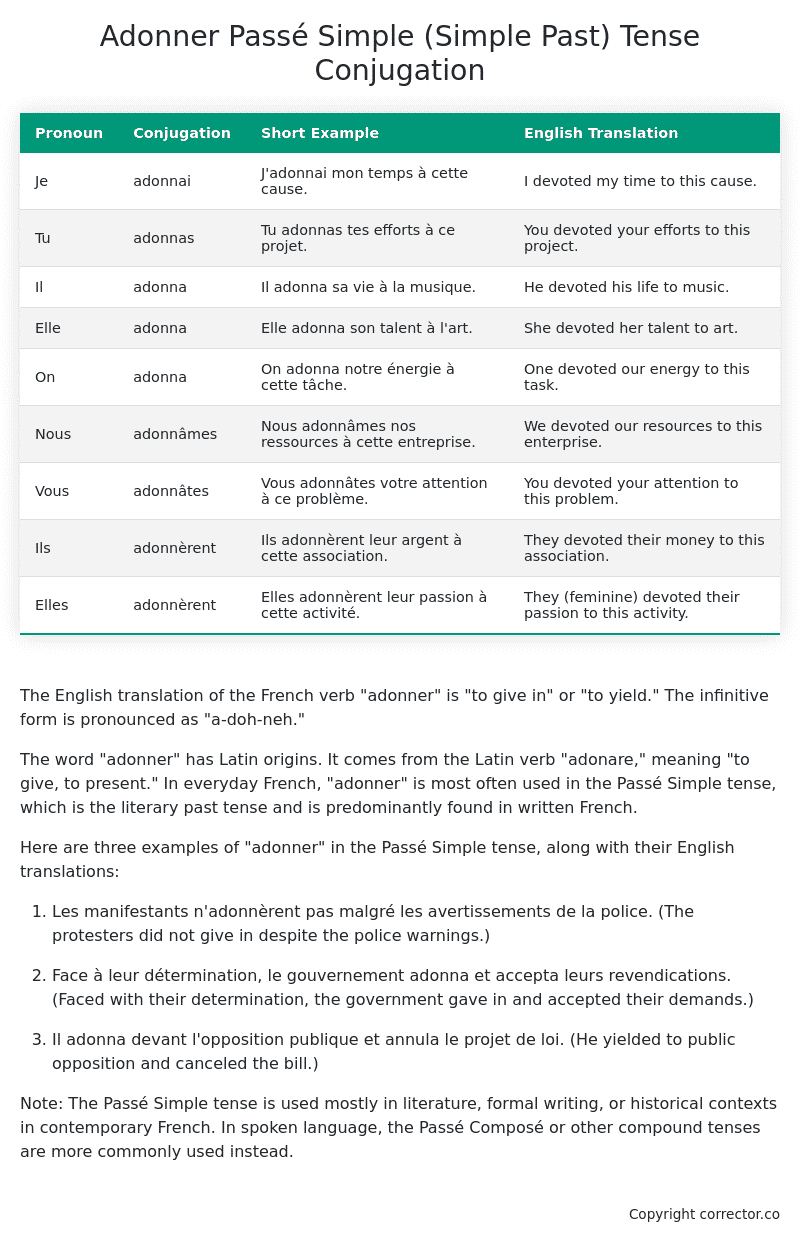Passé Simple (Simple Past) Tense Conjugation of the French Verb adonner
Introduction to the verb adonner
The English translation of the French verb “adonner” is “to give in” or “to yield.” The infinitive form is pronounced as “a-doh-neh.”
The word “adonner” has Latin origins. It comes from the Latin verb “adonare,” meaning “to give, to present.” In everyday French, “adonner” is most often used in the Passé Simple tense, which is the literary past tense and is predominantly found in written French.
Here are three examples of “adonner” in the Passé Simple tense, along with their English translations:
-
Les manifestants n’adonnèrent pas malgré les avertissements de la police.
(The protesters did not give in despite the police warnings.) -
Face à leur détermination, le gouvernement adonna et accepta leurs revendications.
(Faced with their determination, the government gave in and accepted their demands.) -
Il adonna devant l’opposition publique et annula le projet de loi.
(He yielded to public opposition and canceled the bill.)
Note: The Passé Simple tense is used mostly in literature, formal writing, or historical contexts in contemporary French. In spoken language, the Passé Composé or other compound tenses are more commonly used instead.
Table of the Passé Simple (Simple Past) Tense Conjugation of adonner
| Pronoun | Conjugation | Short Example | English Translation |
|---|---|---|---|
| Je | adonnai | J’adonnai mon temps à cette cause. | I devoted my time to this cause. |
| Tu | adonnas | Tu adonnas tes efforts à ce projet. | You devoted your efforts to this project. |
| Il | adonna | Il adonna sa vie à la musique. | He devoted his life to music. |
| Elle | adonna | Elle adonna son talent à l’art. | She devoted her talent to art. |
| On | adonna | On adonna notre énergie à cette tâche. | One devoted our energy to this task. |
| Nous | adonnâmes | Nous adonnâmes nos ressources à cette entreprise. | We devoted our resources to this enterprise. |
| Vous | adonnâtes | Vous adonnâtes votre attention à ce problème. | You devoted your attention to this problem. |
| Ils | adonnèrent | Ils adonnèrent leur argent à cette association. | They devoted their money to this association. |
| Elles | adonnèrent | Elles adonnèrent leur passion à cette activité. | They (feminine) devoted their passion to this activity. |
Other Conjugations for Adonner.
Le Present (Present Tense) Conjugation of the French Verb adonner
Imparfait (Imperfect) Tense Conjugation of the French Verb adonner
Passé Simple (Simple Past) Tense Conjugation of the French Verb adonner (You’re reading it right now!)
Passé Composé (Present Perfect) Tense Conjugation of the French Verb adonner
Futur Simple (Simple Future) Tense Conjugation of the French Verb adonner
Futur Proche (Near Future) Tense Conjugation of the French Verb adonner
Plus-que-parfait (Pluperfect) Tense Conjugation of the French Verb adonner
Passé Antérieur (Past Anterior) Tense Conjugation of the French Verb adonner
Futur Antérieur (Future Anterior) Tense Conjugation of the French Verb adonner
Subjonctif Présent (Subjunctive Present) Tense Conjugation of the French Verb adonner
Subjonctif Passé (Subjunctive Past) Tense Conjugation of the French Verb adonner
Subjonctif Imparfait (Subjunctive Imperfect) Tense Conjugation of the French Verb adonner
Subjonctif Plus-que-parfait (Subjunctive Pluperfect) Tense Conjugation of the French Verb adonner
Conditionnel Présent (Conditional Present) Tense Conjugation of the French Verb adonner
Conditionnel Passé (Conditional Past) Tense Conjugation of the French Verb adonner
Conditionnel Passé II (Conditional Past II) Tense Conjugation of the French Verb adonner
L’impératif Présent (Imperative Present) Tense Conjugation of the French Verb adonner
L’impératif Passé (Imperative Past) Tense Conjugation of the French Verb adonner
L’infinitif Présent (Infinitive Present) Tense Conjugation of the French Verb adonner
L’infinitif Passé (Infinitive Past) Tense Conjugation of the French Verb adonner
Le Participe Présent (Present Participle) Tense Conjugation of the French Verb adonner
Le Participe Passé (Past Participle) Tense Conjugation of the French Verb adonner
Struggling with French verbs or the language in general? Why not use our free French Grammar Checker – no registration required!
Get a FREE Download Study Sheet of this Conjugation 🔥
Simply right click the image below, click “save image” and get your free reference for the adonner Passé Simple tense conjugation!

Adonner – About the French Passé Simple (Simple Past) Tense
Formation
Usage
Narration
Historical Context
Interactions with other tenses
Passé Composé
Imparfait
Conditional and Subjunctive
Summary
I hope you enjoyed this article on the verb adonner. Still in a learning mood? Check out another TOTALLY random French verb conjugation!


